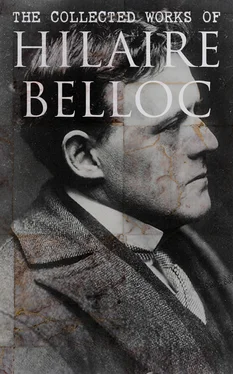I watched the Phocean. I thought of a man of his ancestry three thousand years ago sitting here at the gates of these mountains talking of his travels to dull, patient, and admiring northerners, and travelling for gain up on into the Germanics, and I felt the changeless form of Europe under me like a rock.
When he heard I was walking to Rome, this man of information turned off his flood into another channel, as a miller will send the racing water into a side sluice, and he poured out some such torrent as this:
'Do not omit to notice the famous view S.E. from the Villa So and So on Monte Mario; visit such and such a garden, and hear Mass in such and such a church. Note the curious illusion produced on the piazza of St Peter's by the interior measurements of the trapezium, which are so many years and so many yards, ...' &c., and so forth ... exactly like a mill.
I meanwhile sat on still silent, still drinking beer and watching the Phocean; gradually suffering the fascination that had captured the villagers and the German friend. He was a very wonderful man.
He was also kindly, for I found afterwards that he had arranged with the host to give me up his bed, seeing my weariness. For this, most unluckily, I was never able to thank him, since the next morning I was off before he or any one else was awake, and I left on the table such money as I thought would very likely satisfy the innkeeper.
It was broad day, but not yet sunrise (there were watery thin clouds left here and there from the day before, a cold wind drove them) when, with extreme pain, going slowly one step after the other and resting continually, I started for Porrentruy along a winding road, and pierced the gap in the Jura. The first turn cut me off from France, and I was fairly in a strange country.
The valley through which I was now passing resembled that of the lovely river Jed where it runs down from the Cheviots, and leads like a road into the secret pastures of the lowlands. Here also, as there, steep cliffs of limestone bounded a very level dale, all green grass and plenty; the plateau above them was covered also with perpetual woods, only here, different from Scotland, the woods ran on and upwards till they became the slopes of high mountains; indeed, this winding cleft was a natural passage through the first ridge of the Jura; the second stood up southward before me like a deep blue storm.
I had, as I passed on along this turning way, all the pleasures of novelty; it was quite another country from the governed and ordered France which I had left. The road was more haphazard, less carefully tended, and evidently less used. The milestones were very old, and marked leagues instead of kilometres. There was age in everything. Moss grew along the walls, and it was very quiet under the high trees. I did not know the name of the little river that went slowly through the meadows, nor whether it followed the custom of its French neighbours on the watershed, and was called by some such epithet as hangs to all the waters in that gap of Belfort, that plain of ponds and marshes: for they are called 'the Sluggish', 'the Muddy', or 'the Laggard'. Even the name of the Saone, far off, meant once 'Slow Water'.
I was wondering what its name might be, and how far I stood from Porrentruy (which I knew to be close by), when I saw a tunnel across the valley, and I guessed by the trend of the higher hills that the river was about to make a very sharp angle. Both these signs, I had been told, meant that I was quite close to the town; so I took a short cut up through the forest over a spur of hill--a short cut most legitimate, because it was trodden and very manifestly used--and I walked up and then on a level for a mile, along a lane of the woods and beneath small, dripping trees. When this short silence of the forest was over, I saw an excellent sight.
There, below me, where the lane began to fall, was the first of the German cities.
LECTOR. How 'German'?
AUCTOR. Let me explain. There is a race that stretches vaguely, without defined boundaries, from the Baltic into the high hills of the south. I will not include the Scandinavians among them, for the Scandinavians (from whom we English also in part descend) are long-headed, lean, and fierce, with a light of adventure in their pale eyes. But beneath them, I say, there stretches from the Baltic to the high hills a race which has a curious unity. Yes; I know that great patches of it are Catholic, and that other great patches hold varying philosophies; I know also that within them are counted long-headed and round-headed men, dark and fair, violent and silent; I know also that they have continually fought among themselves and called in Welch allies; still I go somewhat by the language, for I am concerned here with the development of a modern European people, and I say that the Germans run from the high hills to the northern sea. In all of them you find (it is not race, it is something much more than race, it is the type of culture) a dreaminess and a love of ease. In all of them you find music. They are those Germans whose countries I had seen a long way off, from the Ballon d'Alsace, and whose language and traditions I now first touched in the town that stood before me.
LECTOR. But in Porrentruy they talk French!
AUCTOR. They are welcome; it is an excellent tongue. Nevertheless, they are Germans. Who but Germans would so preserve--would so rebuild the past? Who but Germans would so feel the mystery of the hills, and so fit their town to the mountains? I was to pass through but a narrow wedge of this strange and diffuse people. They began at Porrentruy, they ended at the watershed of the Adriatic, in the high passes of the Alps; but in that little space of four days I made acquaintance with their influence, and I owe them a perpetual gratitude for their architecture and their tales. I had come from France, which is full of an active memory of Rome. I was to debouch into those larger plains of Italy, which keep about them an atmosphere of Rome in decay. Here in Switzerland, for four marches, I touched a northern, exterior, and barbaric people; for though these mountains spoke a distorted Latin tongue, and only after the first day began to give me a Teutonic dialect, yet it was evident from the first that they had about them neither the Latin order nor the Latin power to create, but were contemplative and easily absorbed by a little effort.
The German spirit is a marvel. There lay Porrentruy. An odd door with Gothic turrets marked the entry to the town. To the right of this gateway a tower, more enormous than anything I remembered to have seen, even in dreams, flanked the approach to the city. How vast it was, how protected, how high, how eaved, how enduring! I was told later that some part of that great bastion was Roman, and I can believe it. The Germans hate to destroy. It overwhelmed me as visions overwhelm, and I felt in its presence as boys feel when they first see the mountains. Had I not been a Christian, I would have worshipped and propitiated this obsession, this everlasting thing.
As it was I entered Porrentruy soberly. I passed under its deep gateway and up its steep hill. The moment I was well into the main street, something other of the Middle Ages possessed me, and I began to think of food and wine. I went to the very first small guest-house I could find, and asked them if they could serve me food. They said that at such an early hour (it was not yet ten) they could give me nothing but bread, yesterday's meat, and wine. I said that would do very well, and all these things were set before me, and by a custom of the country I paid before I ate. (A bad custom. Up in the Limousin, when I was a boy, in the noisy valley of the Torrent, on the Vienne, I remember a woman that did not allow me to pay till she had held the bottle up to the light, measured the veal with her finger, and estimated the bread with her eye; also she charged me double. God rest her soul!) I say I paid. And had I had to pay twenty or twenty-three times as much it would have been worth it for the wine.
Читать дальше












